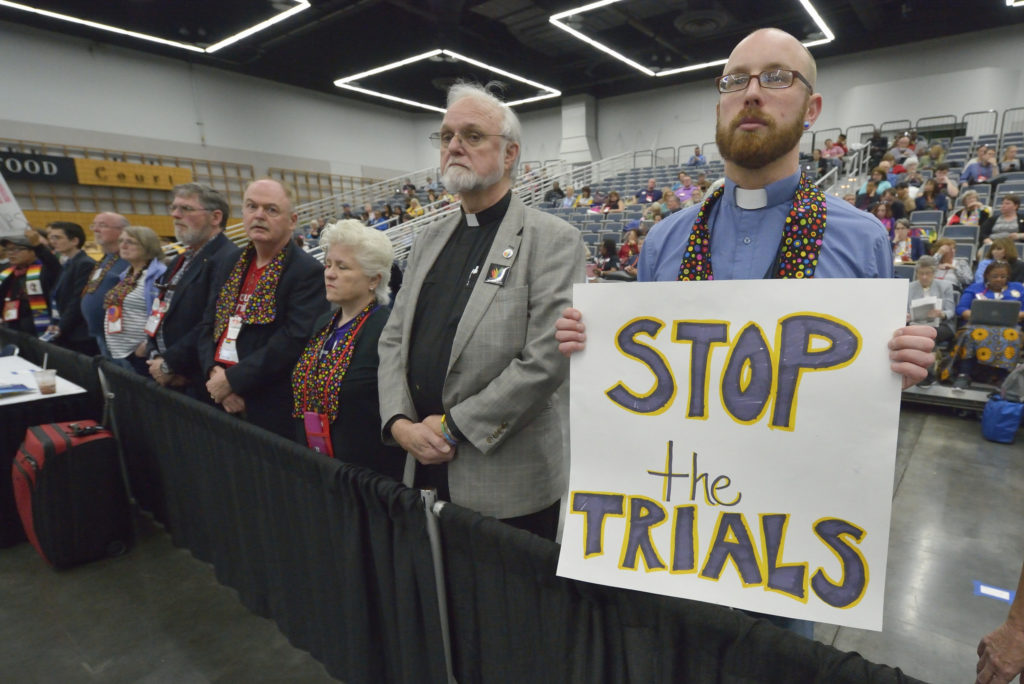The philosopher George Santayana said, “Those who cannot remember the past are condemned to repeat it.” That proverb is especially relevant in the current nullification controversy in the United Methodist Church (UMC).
The word “nullification” generally refers to an unwillingness to obey and defend established laws. The 19th century controversy surrounding nullification had to do with states’ unwillingness to enforce federal laws within their jurisdictions. Senator John C. Calhoun of South Carolina was a leading proponent of nullification. Of course, the controversy was about slavery, and it led to the Civil War.
At the same time, a similar controversy was occurring within the Methodist Church. Earlier in the 19th century, the Methodist movement in America, following the lead of Mr. Wesley, was solidly against slavery. While there are passages in the Old Testament that seem to accept slavery, the New Testament undercut the institution. St. Paul’s admonition to the Galatians became normative for Christians: “There is neither Jew nor Greek, slave nor free, male nor female, for you are all one in Christ Jesus.” Loving one’s neighbor as oneself left no room for slavery. Indeed, St. Paul advised slaves to grab their freedom if they got a chance (I Cor. 7:21).
Methodists in the South began to change their view of slavery early in the 19th century. The Southern economy became more and more dependent on the institution. Slowly but surely, the pressure from the secular society led Methodists in the South to forsake their biblical stand on slavery. In 1844, the Methodist Church in the South broke away from the Northern Church over this issue. Reunion did not come until 1939.
Today some United Methodists in the Northeast and the West are flirting with a latter-day version of nullification. This time the issue is sexual morality in general and homosexual behavior in particular. The Bible’s position on homosexual behavior is even clearer than on the issue of slavery. Old and New Testaments are in agreement that any sexual relationship outside of marriage between a man and a woman is sinful. Nevertheless, clergy and even a few bishops are claiming that the Bible is mistaken in its standards regarding sexual behavior. Some even believe that Jesus was wrong in his definition of marriage (Matthew 19:4-6). They are claiming the right to nullify biblical standards and the United Methodist Book of Discipline in pursuit of what they call “a higher law of love.” Once again, Methodists face a choice between the standards of our secular culture and those of the Bible.
“Those who cannot remember the past are condemned to repeat it.”





Comment by Mike Ward on June 28, 2016 at 8:11 am
“While there are passages in the Old Testament that seem to accept slavery, the New Testament undercut the institution. St. Paul’s admonition to the Galatians became normative for Christians: ‘There is neither Jew nor Greek, slave nor free, male nor female, for you are all
one in Christ Jesus’.”
That passage no more undercuts slavery as in institution than it undercuts gender and sex as fixed at birth.
Comment by Philip on June 28, 2016 at 8:41 am
Many people forget about the “radical religious right” that the Methodists were part of that got Lincoln elected. They were “radical” because they wanted slavery abolished while society just wanted it curtailed.
The theological gymnastics that were needed to justify slavery and the total disregard of Wesley’s research paper on the slave trade should be a lesson to us all on how easily scripture and our own doctrine can be rationalized and warped to fit societal norms.
Comment by the_enemy_hates_clarity on June 28, 2016 at 1:19 pm
Before the Civil War, the Methodists in the South sold out to their culture that supported slavery. Similarly, many (not all) Methodists in the West and the Northeast have sold out to their culture that supports homosexual marriage.
The enemy hates clarity
The enemy hates clarity
Comment by oldag22 on June 28, 2016 at 4:30 pm
We need some more backbone in our leadership who will stand up for the discipline and the Scripture, and say this is how it is, the Word is our guide, we will not change and those opposed to that can stay, or leave. But it is time to end the argument and make known who we as Methodists are, and who we’re going to be.
Comment by Puddleglumm on June 28, 2016 at 8:49 pm
Good article. Sadly, liberals/progressives will do almost anything to see that their agenda goes forward.